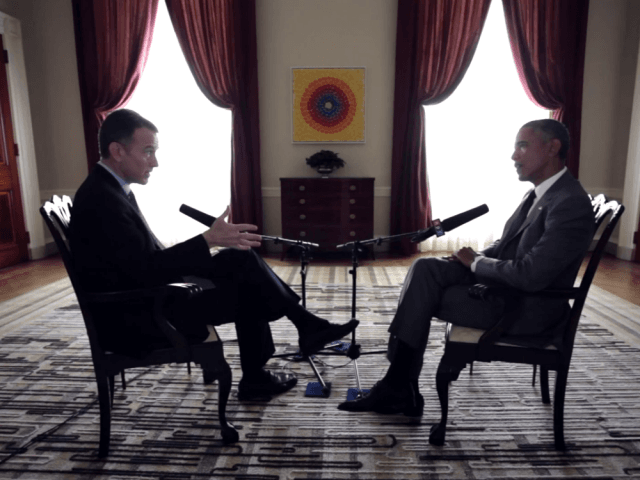President Barack Obama has granted an interview to National Public Radio in an attempt to sell the Iran “framework” to a skeptical public. In the process, he compares the agreement to a real-estate deal–a poor analogy for a man who called his own last property purchase deal “boneheaded” after involving indicted (now convicted) bag Chicago man Tony Rezko. Obama also provided at least five big reasons that Congress–whose opposition is growing–should reject the Iran deal.
1. Iran could have a nuclear weapon after 12 years. Obama volunteers to NPR’s Steve Inskeep “that in year 13, 14, 15, they [Iran] have advanced centrifuges that enrich uranium fairly rapidly, and at that point the breakout times would have shrunk almost down to zero.” Obama argues that would be better than the current breakout time of 2-3 months and that the world would at least know more about the Iranian nuclear program when it did detonate a nuclear weapon.
2. Obama admits the Iranian regime is not going to change. At the outset, Obama says that “this is a good deal if you think Iran’s open to change.” Later, however, in dismissing Israeli Prime Minister Benjamin Netanyau’s demand that a final deal include Iranian recognition of Israel’s right to exist, Obama says that would preclude a deal “unless the nature of the Iranian regime completely transforms.” By his own standard–Iranian openness to change–the deal is dead on arrival.
3. Obama admits Iran will not stop supporting terrorism. Obama admits that sanctions relief will allow Iran to keep funding terror throughout the region and the world. However, he says, Iran does that anyway, even under significant financial pressure. Amazingly, Obama actually offers the example of North Korea as a country that causes mischief despite being isolated. North Korea is the best example of why a nuclear deal like the Iran framework has no chance of success.
4. Russia could stop the UN Security Council from inspecting Iran. The fact that Russia holds a veto on the UN Security Council means that it can effectively protect Iran from international inspections. Obama says he is “trying to design” a system in which nuclear inspectors from the International Atomic Energy Agency (IAEA) do not have to report to the Security Council. The problem? Russia is one of the P5+1 powers. (Obama admits the problem is not yet “resolved.”)
5. There is no way to resolve differences over sanctions. Iran only came to the negotiating table, Obama admits, because of international sanctions (which he opposed, but for which he now takes credit). Yet Iran claims the deal will include an immediate end to sanctions, while Obama says that sanctions will only be lifted later. And Obama acknowledges that he needs Russia’s support to “snap-back” sanctions if Iran violates the deal–a problem for reasons described above.

COMMENTS
Please let us know if you're having issues with commenting.